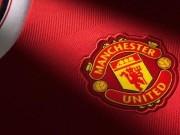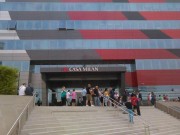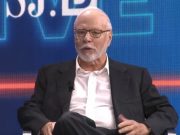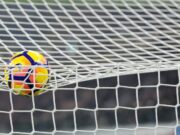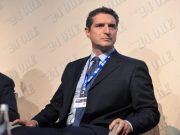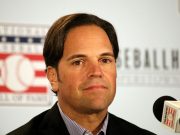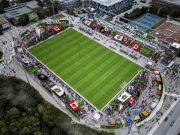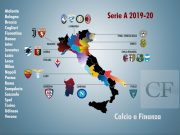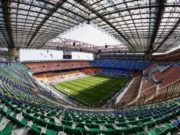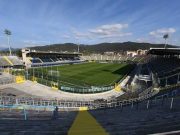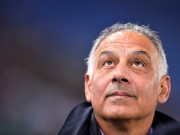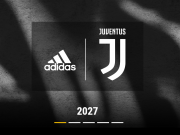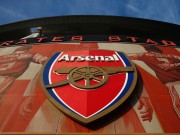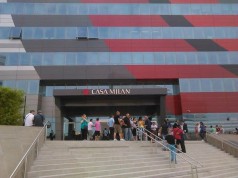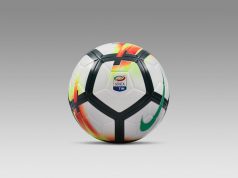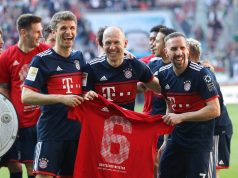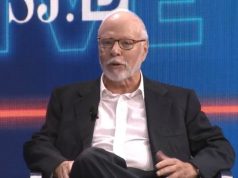On Sunday evening, Newcastle United’s owner Mike Ashley gave a rare public interview to Sky Sports. Ashley has traditionally shunned the spotlight since he bought the Magpies in 2007, but last weekend gave a long and detailed interview about his tenure as Newcastle owner. But does what he said actually stack up?
Ashley is unquestionably a savvy businessman – with a wealth of $3.2 billion (according to Forbes), he is the 20th richest billionaire in the United Kingdom. When he took control of Newcastle in May 2007, he explained in Sunday’s interview that he tried to transfer his business acumen to the world of sport, saying that his aim was “to think in a different time frame, maybe if we had a three-year plan, a five-year plan, a seven-year plan, we could actually build on something at Newcastle United.” But in 10 years, despite posting annual profits instead of annual losses in their end-of-year financial statements, Newcastle have changed managers 12 times and been relegated twice (to put that into context, they hadn’t been relegated before Ashley took over since dropping down from the old Division 1 into Division 2 in 1988/89). Has making money out of Newcastle as a business been more important to Ashley than success on the pitch? Many Newcastle fans would argue so.

The Newcastle owner admits that “I did really get some serious decisions wrong”, including some catastrophic errors of judgement resulting in the club’s first relegation in 2008/09, and which saw him put the club up for sale twice – the second time reminiscent of an eBay auction when the club invited offers of £100m through their official website. Turnover dropped from £86.1 million in 2008/09 to £52.4 million in 2009/10, mainly due to a reduction in TV revenue of 57%, but a necessary refocusing of expenditure saw that the club’s operating loss for their first stint in the Championship was only £33.5 million (compared to £37.7 million in 2008/09).
The Magpies were promoted as champions at the first time of asking under Chris Hughton, ensuring they would receive the lucrative revenue from Premier League TV rights once again. The growth of the top flight’s TV revenue has been unrelenting, and in some senses Ashley is right when he made his analogy that, when he bought Newcastle in 2007, “football was a bicycle back then, it’s now a Formula One car going along in the outside lane”. The 2007-2010 deal was worth a total of £1.706 billion, whereas the 2016-2019 deal is a staggering £5.136 billion (to say nothing of overseas rights).

This is reflected in Newcastle’s finances. When they were relegated in 2008/09, Newcastle brought in £37.2 million between prize money and TV revenue; in 2015/16, this had risen by £35.5 million to £72.7 million. Turnover accordingly increased by £42.7 million, from £86.1 million (2008/09) to £125.8 million (2015/16). This is why, even though Newcastle’s total income increased by 30% under Ashley between 2008 to 2015, it is little to do with the owner’s own involvement – the growth of £33.9 million from 2013 to 2014 is almost entirely down to broadcasting revenue (increase of £27.2 million).
Despite this additional revenue, wages have remained stagnant, barely rising from £71.1 million in the first relegation season of 2008/09 to £75 million in the second relegation season of 2015/16. In fact, only four clubs spent less than Newcastle on wages in 2015/16, and three of those clubs were the teams who had been promoted from the Championship the season before.

Unquestionably, the key moment for Mike Ashley’s Newcastle came in 2011/12 when they finished 5th, but even on the final day they were still in with a chance – albeit a slim one – of finishing in a Champions League place. In the end, Alan Pardew’s side lost at Everton on the final day, but the gap was still bridgeable. But to the frustration of Geordies and Newcastle fans the world over, Ashley refused to invest further in the team in an effort to challenge for a top four spot the next season – the summer’s only notable signing was Vernon Anita (£6.7 million from Ajax). If ever there was an opportunity to look to the immediate future, rather than consider a long-term plan, this was it.
It was an opportunity missed. “People ask me what I’d do differently in football, I’d actually think more short term,” Ashley said on Sunday. “I wouldn’t try building something for five, 10 years’ time, when in actual fact the landscape has completely changed. Therefore your medium or long term views never come into play because it has changed too much by the time you get there.” Hindsight is a wonderful thing, but that is exactly what happened at Newcastle. That September, Pardew was rewarded with an astonishing eight-year contract by Ashley for finishing 5th, but he only remained in his job for just over two of those years before leaving for Crystal Palace. Newcastle have not come close to challenging for Europe again since.

Instead, Ashley’s model for Newcastle model is that the club should be self-sustaining, without relying on additional personal loans, further to the interest-free term loan of £129 million he has already made. With that in mind, Newcastle’s transfer policy shifted under Ashley from signing marquee names (think Michael Owen in the latter days of Freddy Shepherd) to buying younger players from France, Holland and other leagues that offered potential resale value. In Ashley’s mind, this would give him the opportunity to completely revamp the club.
“I thought the difference would be to get the academy right, the training ground, the fans’ prices, the new generation of fans coming through, and building the football club from the ground up. That was where I thought I could make a difference, because I thought I could put in the time and the money.” £10 million was invested on upgrading the training facilities in 2015, and after agreeing to stay on last summer Rafa Benitez insisted on further improvements, from relaying the pitches to installing video games systems for the players.
Later in the interview, Ashley again stressed the importance of developing the club. “In the middle [of my time as owner] I thought I was just about beginning to get my arms around it a little bit, we had a manager [Pardew] on an eight-year contract, had the finance right, we were talking about investing in the training ground and the academy, we had a strategy, buying the better young talent that’s available and developing. That was around 2013, 2014, I thought we were going along quite well.” Despite a £1.5 million investment in the Academy in 2014 from former main shirt sponsors Wonga, Mark Douglas of the local Chronicle wrote earlier this year that the Academy was still an important issue that needed to be resolved as it “still needs work”.

Despite this, Ashley maintained in his interview with Sky Sports that “My dream is from the bottom up. I want to start with the academy, I want to be able to produce Andy Carrolls. I look at Southampton and their academy, and that I think could be done. This would be my dream, to say to people, we always put in an academy player, a mantra for the club, that we give the academy players the first opportunity to get in.” Newcastle and the north east catchment area is a hotbed of football, but of the current first team squad only three players have been promoted from the Academy, and of those only one (Paul Dummett) actually came through Newcastle’s own youth system; the other two (Freddie Woodman and Rolando Aarons) were signed as youth players from Crystal Palace and Bristol City respectively. Then just last month, Newcastle agreed a deal to sell Lewis Gibson, one of their brightest prospects, to Everton in a deal rising to £6 million.
Ashley’s comments on the youth system are not the only part of the interview that do not entirely stack up.
It is impossible to look anywhere inside St James’ Park and not see some form of advertising for Ashley’s own company, Sports Direct, or its subsidiary companies such as Dunlop or Firetrap. In 2013, the club were asked at a fans forum meeting whether Sports Direct were paying ‘the going rate’ for this advertising, and replied – according to the club’s own minutes – “the advertising boards in question were installed with Sports Direct branding as a showcase for unused space. Sports Direct don’t pay, but it would be sold if other advertisers wanted the space.” Ashley even renamed St James’ Park after his own company, and admitted “I should not have done that”. But his explanation for the decision was less than clear.
“I wanted to get naming rights, get money in and invest it into the club,” he said. “The reality is, the vast majority of the Geordie fans would rather have the name of St James’ Park and finish maybe one or two places lower in the table, because they want to keep it special.” At the time, in November 2011, the club explained it would be renamed as a temporary measure to “showcase the sponsorship opportunity to interested parties”, but it remained the Sports Direct Arena until Wonga bought the naming rights back to restore the St James’ Park name in October 2012.

The impact on the club’s commercial revenue was not only negligible, it was negative. In 2011, the club recorded £15.8 million in commercial revenue, but this had fallen to £13.8 million in 2012. The longer-term trend was even more concerning for Newcastle fans: in 2007, before Ashley took charge, the club were bringing in £27.6 million from commercial streams – this fell year on year until 2012, and had slowly risen back to £24.9 million by 2015 (the club’s 2016 financial report does not specify commercial income).
Aside from untapped sponsorship and advertising opportunities, Newcastle have the luxury of being able to extend the use of St James’ Park as a venue for other purposes, such as the rugby league Magic Weekend (hosted at the stadium for the last three years) or music concerts (Ed Sheeran is scheduled to perform there in June 2018). The fact that the club only agreed to Sheeran’s performance because it was “a risk-free income opportunity” suggests, however, that hosting further music events is not currently seen to be commercially desirable.
The potential is there for Newcastle, a vastly underachieving club, and with Benitez the Magpies have one of the world’s very best managers in charge, as Ashley is well aware. “We’ve got the man himself at the moment in Rafa, and let’s hope we can generate some funds, and give Rafa some chance to get some chance to get some building blocks going over the coming years.” But the owner says the required funds will have to be generated by the club’s self-sustaining business model, despite the fact that between 2008 and 2015 the club had an average annual net transfer spend of just £700,000. “Every penny the club generates he can have, but it doesn’t generate enough. It’s Newcastle United, it doesn’t have a £40m a year stadium naming rights deal, it doesn’t. I have put my £250m in the football club, guys, that’s it, there is no more from me, now the club has to generate its own money.”

Even without this hypothetical £40m deal for the club’s stadium naming rights, Newcastle still had the 9th highest turnover in the Premier League in 2015/16. The club have also been profitable (largely thanks to player sales) for the last six years. If the revenue is there, and the wage bill is limited (£75 million – 59% wage bill to turnover, less than many of the club’s Premier League rivals), where is the money going if not into the squad? As Ashley himself said, “every penny the club generates [Benitez] can have”. A major cause for concern for Newcastle and Ashley is, of course, the relegation the club suffered in 2016. The club’s profit after tax dropped from £32.5 million in 2015 to just £4.6 million in 2016, with net debt increasing by 36% to £127.3 million.
If these figures are sobering reading, managing director Lee Charnley warns that next year’s financial accounts for the season in the Championship will be worse. “The financial impact of relegation is difficult to overstate and this will become evident in our next set of financial results for the year ending June 2017,” Charnley explained. “The biggest impact by far is the dramatic reduction in centrally distributed income that comes with dropping down a division; the reality being our income in this area is forecast to fall by over £30m compared to 2015-16.” The losses will be offset to an extent by both the club’s net profit of £30.98 million on transfers in 2016/17 and the fact that, according to the club, “a substantial proportion of the player sales are on deferred terms and will be received over the next 3-4 years, with the result that in the year ending 30 June 2017 there will be a net cash outlay with respect to these transfers”.
Ashley’s conservatism this summer is therefore not totally surprising, despite fans imploring him to invest in the club in order to give Newcastle a better chance of surviving a potentially fatal third relegation under his watch. As the Chronicle reported in July, promotion prize money and parachute payments come to around £47.1 million, and the club have already spent £38.07 million on new players this summer. But there is perhaps another reason. While the club are required to make substantial savings to counteract the expected losses, Ashley’s unwillingness to invest further himself may stem from a longer-term view: that he does not expect to remain the owner of the club indefinitely.

Ruing the amount of money the likes of Manchester City are now able to spend, he told Sky Sports, “That’s why, if someone would like to come along, take this seat and fund Newcastle with a nought on the end with more wealth than me, I will not stand in Newcastle’s way.” Tellingly, as The Guardian’s highly respected writer David Conn reported in June, “it is unclear how solid the reality is of the Chinese investors rumoured to be interested in buying Newcastle, given that overseas football takeovers have now been restrained in China, but it is seen as significant that Ashley has not moved to deny reports.”
That said, while Ashley is prepared to sell up, he does not believe there are many who would be interested in a takeover bid. “I don’t think you’ll find many people out there who will actually stand up and do it”, he said. “So I think myself and the Newcastle fans are going to be together for a good while longer!”


